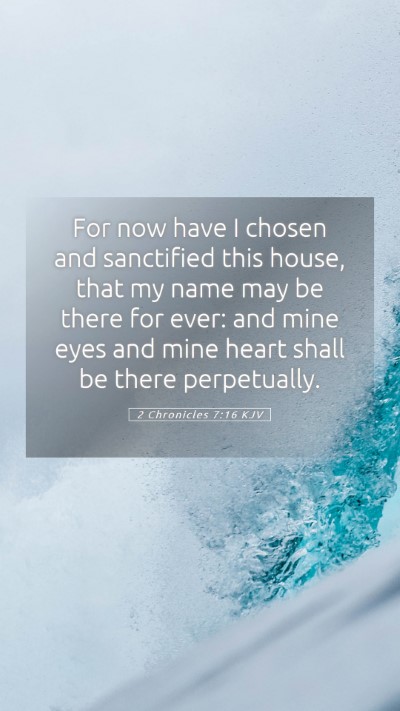Understanding 2 Chronicles 7:16
The verse 2 Chronicles 7:16 is significant in understanding God's promise and the conditional nature of His covenant with His people. This passage reads:
"For now have I chosen and sanctified this house, that my name may be there for ever: and mine eyes and mine heart shall be there perpetually."
In this verse, we find a profound declaration from God concerning the temple Solomon had built. This commentary synthesizes insights from notable public domain sources to provide Bible verse meanings and interpretations that shed light on its significance.
Bible Verse Meaning
The essence of this verse revolves around God's selection and sanctification of the temple in Jerusalem. It emphasizes His presence and commitment to dwell among His people. Below are the key components of the verse distilled from various biblical commentaries:
-
Divine Choice:
Matthew Henry emphasizes that God specifically chose the temple as His dwelling place, which signifies both the importance of the location and the acknowledgment of Solomon's faithful dedication in building it.
-
Sanctification:
Albert Barnes notes that sanctification implies not only purification but also the setting apart of the temple for holy purposes, establishing it as a sacred space for worship and divine communion.
-
Perpetual Presence:
Adam Clarke points out that God's statement about His eyes and heart being there perpetually signifies His continual watchfulness over His people and His enduring love for them. This assurance fosters a sense of security and divine oversight.
Scripture Analysis
2 Chronicles 7:16 serves as a pivotal moment in the historical narrative of Israel, highlighting the covenant relationship between God and His chosen people. The implications are profound for understanding Scripture and the overarching themes present within the Bible.
-
The Temple as a Symbol:
This verse presents the temple not merely as a building but as a central symbol of God's active presence among His people, reflecting the theology of worship inherent in the biblical narrative.
-
Conditional Faithfulness:
God's promise to keep His eyes and heart upon the temple underscores the requirement of faithfulness from the Israelites. If they abandon their covenant with Him, His presence, although sovereign, may be withdrawn.
-
The Nature of Worship:
This passage invites readers to explore the nature of worship in the Old Testament context—how God desires a devoted, faithful people to inhabit His house and the relationship dynamics between the divine and humanity.
In-Depth Bible Verse Commentary
Analyzing this verse within its historical context, we see the culmination of Solomon's efforts and the significance of the temple in Israel's spiritual life. The commentaries provide deeper insight into the cultural and theological dimensions present in 2 Chronicles 7:16:
-
The Historical Context:
This verse comes after Solomon's prayer of dedication, reflecting God's response to the new temple's function. The timing indicates a moment of covenant renewal and national significance for Israel (Commentary Insights).
-
God's Immanence:
While God is transcendent, this verse emphasizes His desire for immanence, highlighting that He chooses to dwell among His creation, which fosters intimacy between God and His people.
-
Theological Implications:
This promise of God's perpetual presence foreshadows New Testament themes, where God ultimately reveals Himself through Christ, merging the divine presence with human experience.
Application of 2 Chronicles 7:16
The relevance of this verse extends beyond its immediate context. In contemporary Bible study, it serves as a reminder of the importance of maintaining a sacred space for worship, both collectively and individually.
-
Personal Application:
Believers today can reflect on their own lives as 'temples' of the Holy Spirit, considering how they manifest God's presence through their actions and worship.
-
Community Worship:
The collective aspect of worship remains crucial; like the Israelites, communities are called to sacralize their gathering spaces, dedicating them to God’s glory.
-
Covenant Faithfulness:
Understanding God's expectations for faithfulness can inspire believers to pursue holiness and a steadfast commitment to His ways.
Cross References
For further understanding, related verses include:
- 1 Kings 8:29-30: God's promise regarding His name in the temple.
- Psalms 132:13-14: Reflects on God choosing Zion as His dwelling place.
- John 14:16-17: Jesus' promise about the Holy Spirit dwelling with believers.
Conclusion
2 Chronicles 7:16 encapsulates God's enduring promise to His people and serves as a vital verse in understanding the significance of worship, covenant fidelity, and the experiential aspect of divine presence. For those engaging in Bible study, this verse provides rich insights into both historical contexts and personal applications in the modern faith journey.


